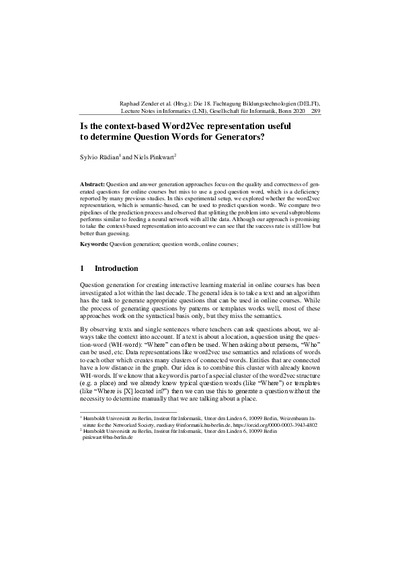Is the context-based Word2Vec representation useful to determine Question Words for Generators?Sylvio Rüdian, Niels Pinkwart
|
 |
 Diese Seite wurde seit 3 Jahren inhaltlich nicht mehr aktualisiert.
Unter Umständen ist sie nicht mehr aktuell.
Diese Seite wurde seit 3 Jahren inhaltlich nicht mehr aktualisiert.
Unter Umständen ist sie nicht mehr aktuell.
 Zusammenfassungen
Zusammenfassungen
 Question and answer generation approaches focus on the quality and correctness of generated questions for online courses but miss to use a good question word, which is a deficiency reported by many previous studies. In this experimental setup, we explored whether the word2vec representation, which is semantic-based, can be used to predict question words. We compare two pipelines of the prediction process and observed that splitting the problem into several subproblems performs similar to feeding a neural network with all the data. Although our approach is promising to take the context-based representation into account we can see that the success rate is still low but better than guessing.
Question and answer generation approaches focus on the quality and correctness of generated questions for online courses but miss to use a good question word, which is a deficiency reported by many previous studies. In this experimental setup, we explored whether the word2vec representation, which is semantic-based, can be used to predict question words. We compare two pipelines of the prediction process and observed that splitting the problem into several subproblems performs similar to feeding a neural network with all the data. Although our approach is promising to take the context-based representation into account we can see that the success rate is still low but better than guessing. Dieses Konferenz-Paper erwähnt ...
Dieses Konferenz-Paper erwähnt ...
 Volltext dieses Dokuments
Volltext dieses Dokuments
 |  Is the context-based Word2Vec representation useful to determine Question Words for Generators?: Konferenzbeitrag als PDF ( Is the context-based Word2Vec representation useful to determine Question Words for Generators?: Konferenzbeitrag als PDF ( : :  , 182 kByte; , 182 kByte;  : :  ) ) |
 Anderswo suchen
Anderswo suchen 
 Beat und dieses Konferenz-Paper
Beat und dieses Konferenz-Paper
Beat hat Dieses Konferenz-Paper während seiner Zeit am Institut für Medien und Schule (IMS) ins Biblionetz aufgenommen. Er hat Dieses Konferenz-Paper einmalig erfasst und bisher nicht mehr bearbeitet. Beat besitzt kein physisches, aber ein digitales Exemplar. Eine digitale Version ist auf dem Internet verfügbar (s.o.). Aufgrund der wenigen Einträge im Biblionetz scheint er es nicht wirklich gelesen zu haben. Es gibt bisher auch nur wenige Objekte im Biblionetz, die dieses Werk zitieren.










 Biblionetz-History
Biblionetz-History